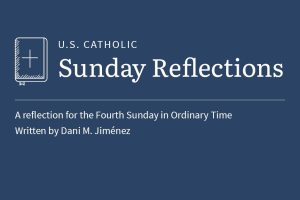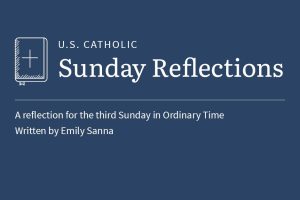Readings (Year B):
2 Chronicles 36:14 – 16, 19 – 23
Psalms 137:1 – 2, 3, 4 – 5, 6
Ephesians 2:4 – 10
John 3:14 – 21
Reflection: Come into the light
The readings for the fourth Sunday of Lent, in this cycle, do not open on a positive note. I try to keep my Lenten obligations, but I am always beset by doubts and readings like this can feel like fuel for that fire. Am I adding “infidelity to infidelity?” Am I polluting my local parish when I, a sinner, show up for mass?
But the point of Lent, or one point of Lent, is the light in the darkness. We know the ending and technically, the apostles and other followers of Christ during his life, also knew—if they had truly listened and believed. But sometimes, it can be hard to believe. I can say that, if I had been there, in those days that followed the crucifixion of Jesus, I would have had faith, but I’m not sure that’s true. Probably, I would have been in despair.
I took St. Thomas Aquinas as my saint upon my confirmation, after going through the Rite of Christian Initiation of Adults (RCIA) because I like to think of myself as a bit of an intellectual, kind of a smart guy. But I was also thinking of another Thomas: “Doubting Thomas,” the one who wasn’t in the room when Jesus first appeared to the apostles after the resurrection and who kept on doubting that Jesus had really risen from the dead.
Why did he doubt? I think it was a kind of despair.
Today’s reading from Hebrew scripture describes how Cyrus of Persia put an end to the Babylonian captivity of the Jewish people. Paul’s letter to the Ephesians is also joyful and upbeat, writing that we are offered a way past our sins and transgressions. The gospel reading for this Sunday states:
“And this is the verdict, that the light came into the world, but people preferred darkness to light, because their works were evil. For everyone who does wicked things hates the light
and does not come toward the light, so that his works might not be exposed. But whoever lives the truth comes to the light, so that his works may be clearly seen as done in God.”
Why I am sometimes afraid to come out into the light? I’m not wicked, am I? I’m not a lawbreaker. I’m a good father and husband. I attend mass regularly. I even teach Sunday school. But that doubt and despair that the Apostle Thomas experienced can also feel shameful. How can I doubt if I truly believe? How can I despair if I believe in Christ? What am I doing wrong?
One thing I can do right is come into the light and expose myself to it.
In a poem I wrote about Doubting Thomas, I note that he is not always known by that name. In India, he is the “Apostle Thomas” who brought the gospel of Christ to that nation, and, according to some traditions, from there to China. There is even an account of him preaching to the Guarani-speaking peoples in Paraguay. I doubt that last one, no pun intended. But I am grateful for his example of redemption for doubters. He doubted, but he also found his way into the light.













Add comment